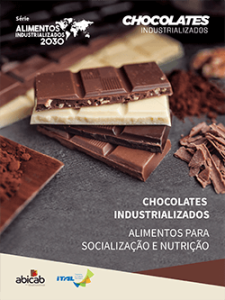MYTHS AND FACTS RELATED TO INDUSTRIALIZED CHOCOLATES
The analysis of the samples of 483 CHOCOLATES reveals the facts that bring down myths related to industrialized products.
MYTH: THEY ARE POOR IN NUTRIENTS
FACT: THEY ARE NUTRITIVE, CONTAIN CHARACTERISTIC NUTRIENTS OF HAMBURGERS
- Characteristic nutritional composition of a hamburger made with MEAT or VEGETABLES
- They are usually strong sources of PROTEINS and contains significant quantities of FIBERS and IRON
- There are hamburgers prepared in a way they contain probiotics, Omega 3, among other functional ingredients
MYTH: THEY HAVE HIGH QUANTITIES OF FAT, SUGAR, AND CALORIES PER GRAM
FACT: IN MEAT PRODUCTS, THE QUANTITIES OF FAT AND CALORIES ARE CHARACTERISTIC OF RAW MATERIALS, BUT THEY VARY SIGNIFICANTLY ACCORDING TO THE TYPE OF MEAT USED (BEEF, POULTRY, PORK, FISHED, MIX OF THESE). THERE ARE PRODUCTS WITH REDUCED CONTENT OF SUGAR AND FAT
- The quantities of SATURATED FATS vary a lot according the different types of hamburgers
- There are versions with fat reduction
MYTH: THEY HAVE HIGH QUANTITIES OF SODIUM
FACT: IN AVERAGE, SALTY HAMBURGERS CONTAIN A HIGHER QUANTITY OF SODIUM WHEN SEASONED ACCORDING TO THE CONSUMERS TASTE
- Many hamburgers are seasoned using salt because it is the basic ingredient in ready-to-eat meat preparation, but there are brands that do not add salt, leaving it to the costumer to add salt during the preparation
- The quantity of salt used vary significantly among different brands and different types, it is not possible to generalize
MYTH: THERE IS LITTLE PRESENCE OF IN NATURA FOOD
FACT: MEAT AND VEGETABLES ARE THEIR MAIN INGREDIENTS, THE SAME RAW MATERIAL USED IN HAMBURGER BARS AND IN HOMEMADE HAMBURGERS
- Basically, industrialized hamburgers are made with war material in natura or minimally processed
- Industrialized hamburgers are not made from substances originated from food or synthesized from other organic sources
- Industrialized hamburgers are not imitations of homemade hamburgers
- Industrialized hamburgers are not inventions of the moder science and food technology applied to the industries, C&T de alimentos has evolved significantly in the last decades and contributed to improve the products quality and safety
MYTH: FALSE BECAUSE THEY ARE PRESENT IN FOOD INGREDIENTS OF INDUSTRIAL USE
FACT: THERE IS THE USE OF INDUSTRIAL (MODIFIED STARCH, MALTODEXTIN, ETC.), BUT IT IS NOT A RULE OF THUMB IN THE SECTOR, AND ALL OF THEM ARE APPROVED BY ANVISA (MINISTRY OF HEALTH) AS SAFE FOR CONSUMPTION
- Some companies use a large quantity of ingredients, however, other don’t
- In an industrial scale, it can be inevitable to use food raw materials in its original state, being its processing necessary. However, the processes used in the ingredients processing or extraction are developed and used in compliance with the technical and safety standards
- The ingredients of industrial use used in some hamburgers of the analyzed ample are, modified starch, maltodextrin, collagen and protein concentrate. All of them have technological purposes and are provided in the legislation that authorizes its safe use, originated form corn, meat, milk, among other basic foods
MYTH: THEY ARE BAD BECAUSE THEY HAVE A HIGH NUMBER OF INGREDIENTS
FACT: THE NUMBER OF INGREDIENTS VARY ACCORDING TO THE MANUFACTURER, BUT THIS IS NOT AN INDICATOR OF LACK OF QUALITY, HEALTH, OR SAFETY
- Some companies use large quantities of ingredients, however, others do not. Many products are prepared only with molded and frozen meat
- Using a high number of ingredients has no relation with the LOWER quality or safety of a food product. There is no scientific evidence to state that a product with 4 ingredients has a better quality and is safer than another with 5 or more ingredients
MYTH: THEY USE ADDITIVES CAPABLE TO MAKE THE PRODUCT EXTREMELY ATTRACTIVE (ADDITIVE)
FACT: ANY COMPANY LOOKS FOR WAYS TO MAKE THEIR PRODUCT ATTRACTIVE, BUT THERE NO ADDITIVES CAPABLE OF ADDICTING THE CONSUMER. AS WELL AS AT THE HOMEMADE COOLING AND SNACK BARS, NATURAL ADDITIVES ARE ALSO ADDED, SUCH AS ROSEMARY AND OREGANO
- Some companies use many ADDITIVES, for technical or food safety reasons, however, other don’t
- Generally, the additives are used in very low quantities in relation to the main ingredients
- Many analyzed products do not use THICKENERS, STABILIZERS, EMULSIFIERS, DYES, FLAVORING and PRESERVATIVES
- All ADDITIVES used in industrialized chocolates manufacturing are included in the specific legislation that authorizes its safe use, being used for technical and safety reasons for the consumption products
MYTH: THEY ARE FREQUENTLY ADDED WITH AIR OR WATER
FACT: WATER IS NOT A RAW MATERIAL INCORPORATED IN CHOCOLATE MANUFACTURING. OH THE OTHER HAND, AERATED CHOCOLATES ARE WELL APPRECIATED
MYTH: THEY ARE BAD BECAUSE THEY HAVE UNFAMILIAR INGREDIENTS NAMES
FACT: IN FACT, SOME INGREDIENTS ARE A LITTLE FAMILIAR, BUT EACH OF THEM HAS ITS PURPOSE. THIS IS ALSO NOT AN INDICATOR OF LACK QUALITY, HEALTH, OR SAFETY
- The additives use technical nomenclature, which is not familiar to many people. But the name has nothing to do with the safety or health of an ingredient
- Many products are prepared with natural ingredients such as rosemary, oregano, sage, etc., to serve consumers with such a preference
MYTH: THEY USE HARMFUL MANUFACTURING PROCESSES
FACT: THE MANUFACTURING PROCESSES ARE SAFE. THE INDUSTRIES OF THE SECTOR USE QUALITY ANS SAFETY SYSTEMS IN THE ENTIRE PRODUCTION PROCESS
- Most of the processing stages and techniques do not imply in the product loss of quality or its inadequacy for consumptionA maior quantidade de etapas e técnicas de processamento não implica perda de qualidade do produto ou sua inadequação para consumo
- Na fabricação de chocolates são utilizados processos físicos, considerados tecnologias “limpas” (Ex.: mistura de ingredientes, refino, conchagem e resfriamento)
- As técnicas de processamento existentes são bastante sofisticadas, usadas para preservar a aparência e textura dos chocolates, com sistemas dedicados a assegurar a qualidade e segurança dos produtos




